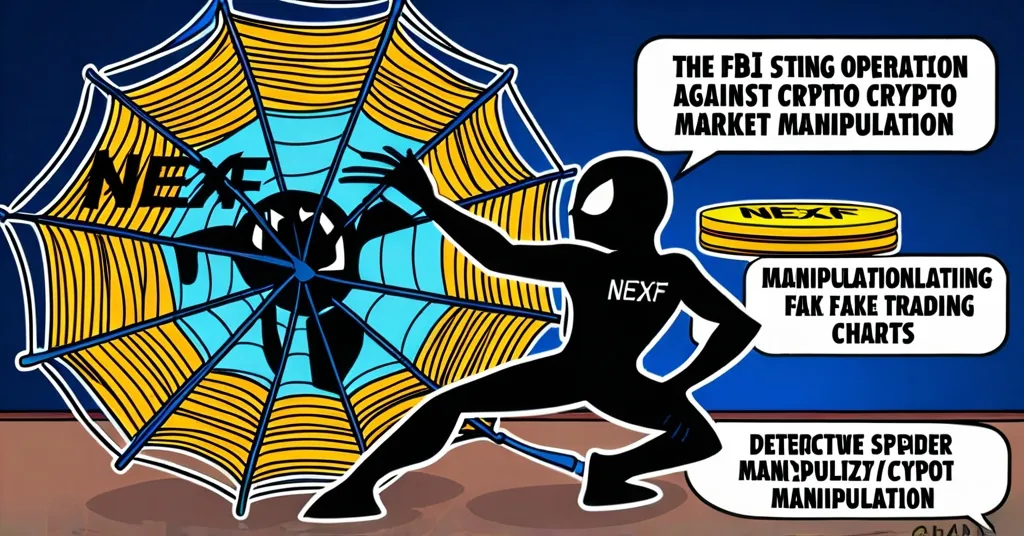FBI’s Fake Token NextFundAI Nabs CLS Global in Wash Trading Sting

Crypto Company CLS Global Caught in FBI’s Fake Token Trap
– FBI uses fake token NextFundAI (NEXF) to catch CLS Global in wash trading.
– CLS Global admits guilt, faces fines, and agrees to strict compliance measures.
– Case highlights growing regulatory efforts to combat crypto market manipulation.
Imagine a token so fake, it’s designed to catch the fakers. That’s exactly what happened with NextFundAI (NEXF), a token concocted by the FBI to ensnare CLS Global, a UAE-based crypto firm, in a web of deceit and manipulation. In a plot worthy of a financial thriller, the FBI’s innovative use of a fake token has brought down CLS Global, marking a significant moment in the ongoing battle against crypto market manipulation.
CLS Global has confessed to engaging in what’s known as “wash trading” with the FBI-created token NextFundAI (NEXF). Wash trading, or fake trading, involves an individual or entity buying and selling assets to themselves to artificially inflate trading volumes. It’s like a one-person show where the same actor plays both the buyer and the seller, creating a false sense of market activity. This deceptive practice led to charges of fraudulent manipulation of trading volumes and wire fraud against CLS Global. As part of their plea deal, the firm has agreed to pay a hefty fine of $428,059, forfeit funds held on the crypto exchanges Binance and KuCoin, stop serving US clients, undergo three years of probation, and annually certify compliance with SEC regulations.
This case isn’t just a blow to CLS Global; it’s a watershed moment for the entire crypto industry. It’s the first instance where the FBI has deployed a fake token in a sting operation to identify and prosecute market manipulators. The operation didn’t stop at CLS Global; it led to charges against 18 individuals and another firm, MyTrade MM, showing just how widespread this illicit scheme was.
The SEC has also stepped in, filing civil charges against CLS Global. Any money seized or paid by CLS Global will be credited towards resolving these charges, demonstrating a coordinated and serious effort between the SEC and the FBI to tackle fraudulent activities in the crypto space.
What is Wash Trading?
Wash trading is illegal because it tricks the market. By generating false activity, it can mislead investors and distort the market’s integrity. It’s a major focus for regulators who want to protect investors and ensure fair trading. Think of it as a magician’s trick where the audience thinks they see busy trading, but it’s all smoke and mirrors.
The FBI’s Sting Operation
The FBI’s use of the NEXF token represents a new frontier in the fight against crypto fraud. By creating a fake token, they effectively set a trap to catch those engaging in illegal activities. This innovative approach worked, bringing down not just CLS Global but also exposing a network of manipulators.
Beyond the Sting: Broader Implications for Crypto
This case serves as a stark reminder of the challenges in regulating decentralized markets. As the crypto industry continues to evolve and disrupt the financial status quo, so too do the efforts of regulatory bodies to use ever-more sophisticated tactics to maintain market integrity and protect investors from fraudulent schemes. While we celebrate the potential of blockchain and decentralization, we must also confront the dark sides head-on.
Key Questions and Takeaways:
- What actions did CLS Global agree to as part of their plea deal?
CLS Global agreed to pay a fine of $428,059, forfeit funds held on Binance and KuCoin, stop serving US clients, undergo three years of probation, and annually certify compliance with SEC regulations.
- How was the NEXF token used by the FBI?
The NEXF token was created by the FBI as part of a sting operation to track and identify individuals and firms engaging in market manipulation and fraudulent activities within the crypto space.
- What does wash trading involve and why is it illegal?
Wash trading involves buying and selling assets at the same time to generate false market activity, which is illegal because it manipulates trading volumes and prices, deceiving investors and distorting market integrity.
- What other entities were involved in the NEXF token scheme?
Alongside CLS Global, 18 individuals and another firm, MyTrade MM, faced charges related to the NEXF token scheme.
- How does this case reflect broader issues in the crypto market?
This case highlights the ongoing challenge of market manipulation in the decentralized and often unregulated crypto space, as well as the increasing efforts by law enforcement to use innovative tactics to combat such activities.
As this saga unfolds, it’s clear that the crypto world must remain vigilant against manipulation and fraud. The use of fake tokens by law enforcement may well become a new norm, signaling a robust and proactive approach to safeguarding the integrity of this revolutionary financial landscape.
“Moneys seized from or paid by CLS Global will be credited in the SEC resolution, and vice versa,” the district attorney’s office said.
In the world of crypto, it turns out the only thing more fake than some tokens is the trading behind them. As we champion decentralization, freedom, and the disruptive potential of blockchain technology, tackling these dark sides head-on is crucial. The future of finance—and indeed, the ethos of effective accelerationism—depends on it.



